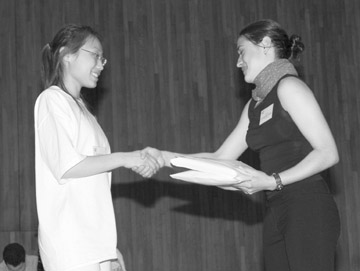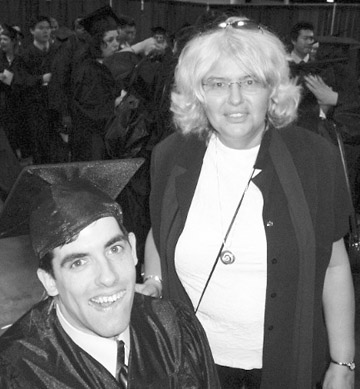Eight Weeks In: New VC of Finance on Budget Cuts, Dorms
March 5, 2004
At the start of her eighth week at work here at UMass Boston, the new Vice Chancellor of Administration and Finance Ellen O’Connor sat down with The Mass Media to talk budget cuts, dorms, and the new Campus Center.
For any head of administration and finance, the threat of budget cuts looms large, especially at UMass Boston, which has sustained more than $30 million dollars worth of reductions in state subsidies over the last three years. “It’s just staggering the amount of reduced appropriation,” said O’Connor.
“The CURE Committee and the belt-tightening and revenue-raising efforts that [Chancellor] Jo Ann [Gora] and David [MacKenzie], my predecessor, inaugurated were very difficult and challenging, and caused some real cutting back, but I think that they are enough.” A cost-cutting Committee on University Resources and Expenditure (CURE) had been formed last year.
But not all of the recommendations, like “selective shutdowns” of the campus during vacations, made it through, leaving a “significant” but “manageable” budget gap, according to MacKenzie in an interview before he left. “The budget gap that David was worried about because some the CURE spending reductions didn’t materialize was compensated for by the new appropriation. So for this year, the gap has been closed,” she said.
“Budgeting in the public sector is a high-wire act and every year is a challenge,” she said. “I think for this year, no additional action is going to be necessary. Following through on the spending reductions, eating into reserves. That was planned, if we stick with that, we’re going to be okay. That plus the money from the legislature.”
O’Connor is cautiously optimistic for 2005. “A question mark there is the amount of state subsidies. The amount the governor recommended to the legislature is a very, very good start, and does not reflect further cuts,” she said. “Part of the reason they said the FY05 budget is starting to look not too bad is that the governor built in at least half of what is need for next year’s value of the wage increases. Now, it would’ve been preferable if he had built in a hundred percent of what was necessary but nevertheless, a substantial amount of what is necessary to fund the second year of these wage increases is in the budget.”
Earlier, the legislature had passed an $81.1 million dollar emergency spending bill, which included a one-time only 15% pay increase for UMass faculty, the first they had received in three years. “Those the legislature has provided appropriation this year for six months worth of salary increases for unit, i.e., union-negotiated pay increases, with a couple of exceptions,” she said. “One of which I think sounds like a botched job from beginning to end-that is that the agreements weren’t ready on time, didn’t get set up. It’s coming, but that money hasn’t been appropriated, it’s lagged behind.” For the overwhelming majority of employees, there was a separate appropriation beyond the UMB budget for their collective bargaining increases, she said.
The issue of dorms is another problem. Dorms were stalled last year when Governor Mitt Romney put a crucial bond sale on hold, releasing it only when dorms were pulled from the table. The prospect of dorms has also drawn criticism from a number of groups in and around the university community.
“David had done some very exceptional and important work on the dorms,” she said of MacKenzie, who O’Connor had also worked with when she was the budget director for the state and he was on the staff of the senate Ways and Means Committee more than a decade ago. MacKenzie pulled his UMass Boston retirement papers at the last minute to become executive director of the UMass Building Authority, the financing arm of the university system, to help create the flow of funds for capital approval. “So you can imagine he still remains a critically important person to UMass Boston.”
MacKenzie had also helped with the construction of the Campus Center by getting its financing when he was vice chancellor.
O’Connor pointed to a recent Boston Globe article on the new building. “They made the comparison to campus centers, like University of Arizona with the rock wall and you know-those campus centers only have cafeterias and rock walls. They don’t necessarily have administrative offices and conferences. Ours is a new creature, a new entity and we expect and are planning that all three entities [student center, administrative operations, and conferences] work collaboratively, harmoniously, and profitably.”
With construction done and campus units slowly moving in, a Campus Center fee is expected to help pay off the debt of the new building. It cost $75 million to build, half of which was financed by the state, the other half shouldered by the university. The UMass Board of Trustees approved the fee in 1995. The Campus Center is expected to eventually become a self-supporting operation thanks to the fee and revenues from conferences and other events.
But despite the excitement surrounding the Campus Center, focus remains on the problem of student housing. The need for housing for UMass Boston students is huge, according to O’Connor. “We still have a terrific number of students who need housing. We’re working with Boston developers and developers south of us to see what we can do to identify some housing options,” said O’Connor, who in 1999 came back to Boston after several years in Washington, D.C. to become the chief financial officer of Community Builders, Inc., a 12-state, 80-location housing company. “I mean, I know your readers know this, but there’s a housing crisis in Boston, and has been for five plus years. That there’s not enough rental housing for families, for individuals, for students, for aunts, for uncles, you know, there’s just not enough.
“And then, within that, there’s not enough housing in Boston for students. So UMass Boston is responding to a very real need in trying to develop options that are suitable and meet the needs and can be supported by the community and the governor.”
The university is proposing to put together a number of housing options, she said. “I think we’re probably not looking at one project that produced or addresses or cures the need for student housing, and are now looking at a plan that would have three or four elements that would have some on-campus housing, off-campus housing, very near here and off-campus housing one, two metro stops away. In other words, a repertoire of housing options for students.”
Before coming to UMass Boston, O’Connor had worked as vice president for finance at Brown University, which she called her “training ground” for UMB. She said she tells people, “‘the difference between UMass Boston and Brown is, UMass Boston has double the number of students and half the money.'”
“So, it’s quite a challenge,” she said.























































